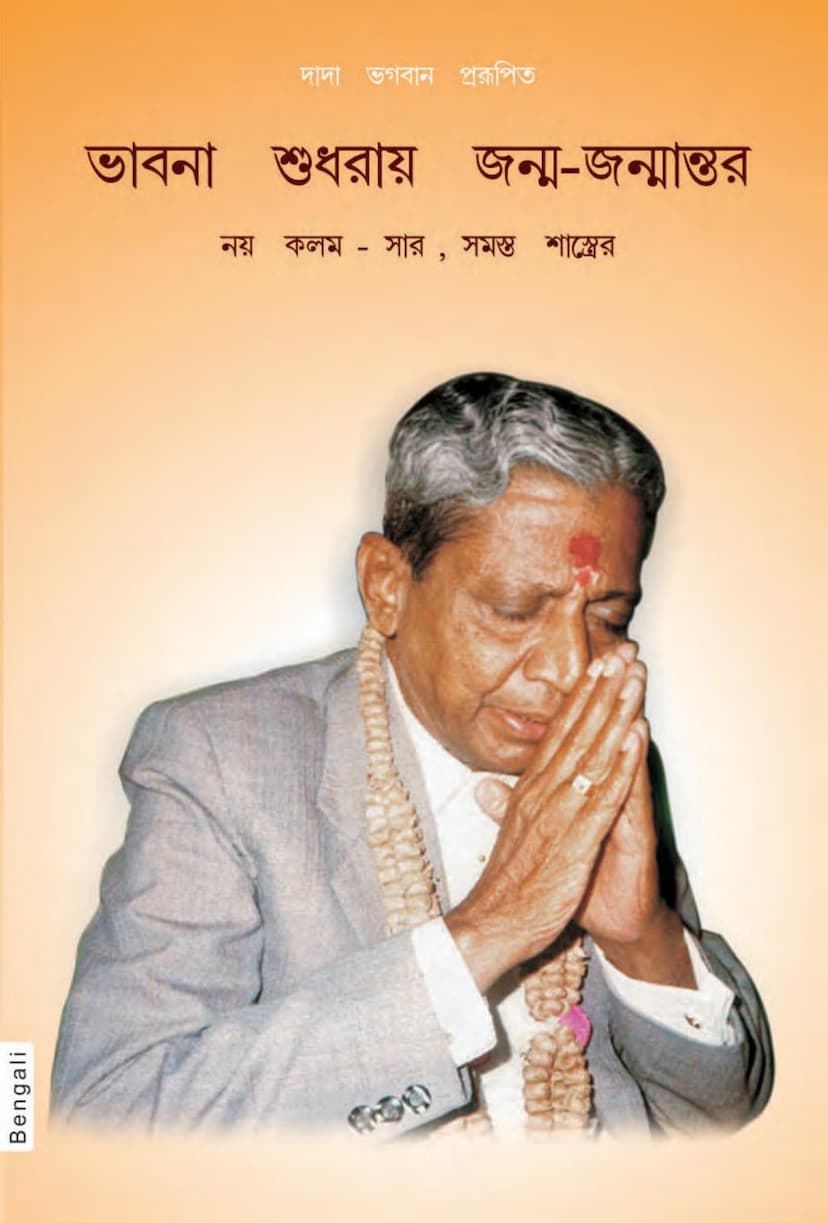The Essence Of All Religion Bengali
Added to library: September 2, 2025

Summary
This document is a Bengali translation of a book by Dada Bhagwan titled "The Essence Of All Religion" (ভাবনা শুধরায় জন্ম-জন্মান্তর - Thoughts rectify births and deaths). The core message of the book revolves around "Naya Kalam" (নয় কলম), which translates to "Nine Points" or "Nine Articles," presented as the essence of all scriptures and a path to spiritual liberation.
Here's a comprehensive summary of the key themes and teachings within the text:
The Core Teachings of Dada Bhagwan and the "Naya Kalam":
- Dada Bhagwan: The book introduces Dada Bhagwan as a manifestation of the Self (the pure soul) within Shri Ambalal Muljibhai Patel. He is described as a Gnani Purush (Knower) who, in 1958, experienced a complete self-realization and the understanding of all spiritual questions. He attained self-knowledge in just one hour, a rapid path known as the "Akram Marg" (অক্রম মার্গ) or "draftless path," contrasting with the gradual, step-by-step "Kramik Marg" (ক্রমিক মার্গ).
- The "Naya Kalam" (Nine Points): These are presented as the distilled essence of all religious scriptures. Dada Bhagwan states that contemplating these nine points can rectify births and deaths across lifetimes. The "Naya Kalam" consists of nine specific prayers or affirmations, each asking Dada Bhagwan for the strength to:
- Not to cause suffering to any living being's ego: This includes not causing suffering, not causing others to suffer, and not consenting to suffering. It also asks for the strength to speak, behave, and think in a way that is acceptable to all ("Sadvada").
- Not to hurt any religious belief: This involves not offending, not causing offense, and not consenting to offense. It emphasizes speaking, behaving, and thinking in an all-acceptable manner ("Sadvada").
- Not to speak ill of, offend, or disrespect any religious leader, ascetic, or guru.
- Not to feel a lack of, or to scorn, any living being: This extends to not causing others to feel a lack or scorn, and not approving of such actions.
- Not to use harsh or stinging language: It also includes the strength to respond with gentle and straightforward language when faced with harshness.
- Not to harbor desires or faults related to sensual passions towards any living being, regardless of gender: This also requests the strength to remain constantly detached ("nirvikar").
- Not to be greedy for any specific taste: It asks for the strength to accept all tastes in food ("Sarvaras") with equanimity.
- Not to speak ill of, offend, or disrespect any living being, directly or indirectly, alive or dead: This also encompasses not causing others to do so or approving of such actions.
- To become instrumental for the welfare of the world.
- Seeking Strength from Dada Bhagwan: The central practice recommended is to repeatedly seek strength from Dada Bhagwan to implement these nine points. It is emphasized that this is not about doing but about seeking divine strength, which will naturally lead to correct actions.
- The Power of Thoughts (Bhavna): The book stresses that thoughts are the cause, and actions are the effect. By changing one's underlying thoughts and intentions, the consequences will automatically change. The "Naya Kalam" is the tool to rectify these causal thoughts.
- The Akram Marg (Draftless Path): This path is highlighted as a direct link to self-knowledge. It emphasizes that true spiritual progress comes from receiving self-knowledge directly from an embodied Gnani Purush, just as one enlightened lamp can light another.
- Pratikraman (Atonement/Repentance): The text explains the importance of Pratikraman, which means to wash away the stain of any mistake immediately. It is compared to washing a stain as soon as it appears. The "Naya Kalam" itself is a form of Pratikraman and helps in seeking strength to prevent future mistakes.
- Sadvada (All-Acceptable): This is a key concept emphasized in several of the "Naya Kalam" points. It means understanding another person's viewpoint and interacting with them in a way that does not hurt their beliefs or ego.
- Distinguishing Thought (Bhavna) from Intention (Bhav): The book differentiates between "Bhavna" (thought, aspiration) and "Bhav" (intention, which is the charge of karma). The "Naya Kalam" is presented as a way to work on "Bhavna" for self-purification.
- The Importance of Humility and Seeking Strength: Repeatedly asking for strength from Dada Bhagwan is crucial. It's not about intellectual understanding but about receiving the necessary power. The book states that humans cannot achieve these spiritual states through their own efforts alone; divine grace and strength are essential.
- Past Karma and Future Results: The book suggests that the "Naya Kalam" plants seeds that will bear fruit in future lives, helping to rectify past karmic consequences. It's a gradual process, and continuous practice is key.
- The "Naya Kalam" as a "Medicine": Dada Bhagwan refers to the "Naya Kalam" as a "reading medicine" that breaks all obstacles. It's meant to be read and absorbed, not just intellectually processed.
Key Messages and Advice:
- Focus on Internal Change: The emphasis is on transforming one's inner state (thoughts, intentions) rather than solely focusing on external actions or trying to change outcomes directly.
- Acceptance and Non-Judgment: The teachings promote accepting everyone's beliefs and viewpoints, avoiding criticism and judgment.
- The Power of Positive Reinforcement: By constantly seeking strength through the "Naya Kalam," one gradually aligns their thoughts and actions with spiritual principles.
- No Self-Effort, Only Seeking Strength: The core practice is to ask for strength, recognizing that self-effort alone can lead to ego and further entanglement.
- The "Naya Kalam" is Unique and Powerful: It's presented as a direct revelation and a practical tool that surpasses the complexity of other scriptures, containing immense power for spiritual liberation.
In essence, "The Essence Of All Religion" by Dada Bhagwan, through the "Naya Kalam," offers a practical and scientifically-explained path to spiritual purification and liberation by aligning one's intentions and thoughts with universal principles of non-violence, acceptance, and detachment, all facilitated by seeking divine strength.